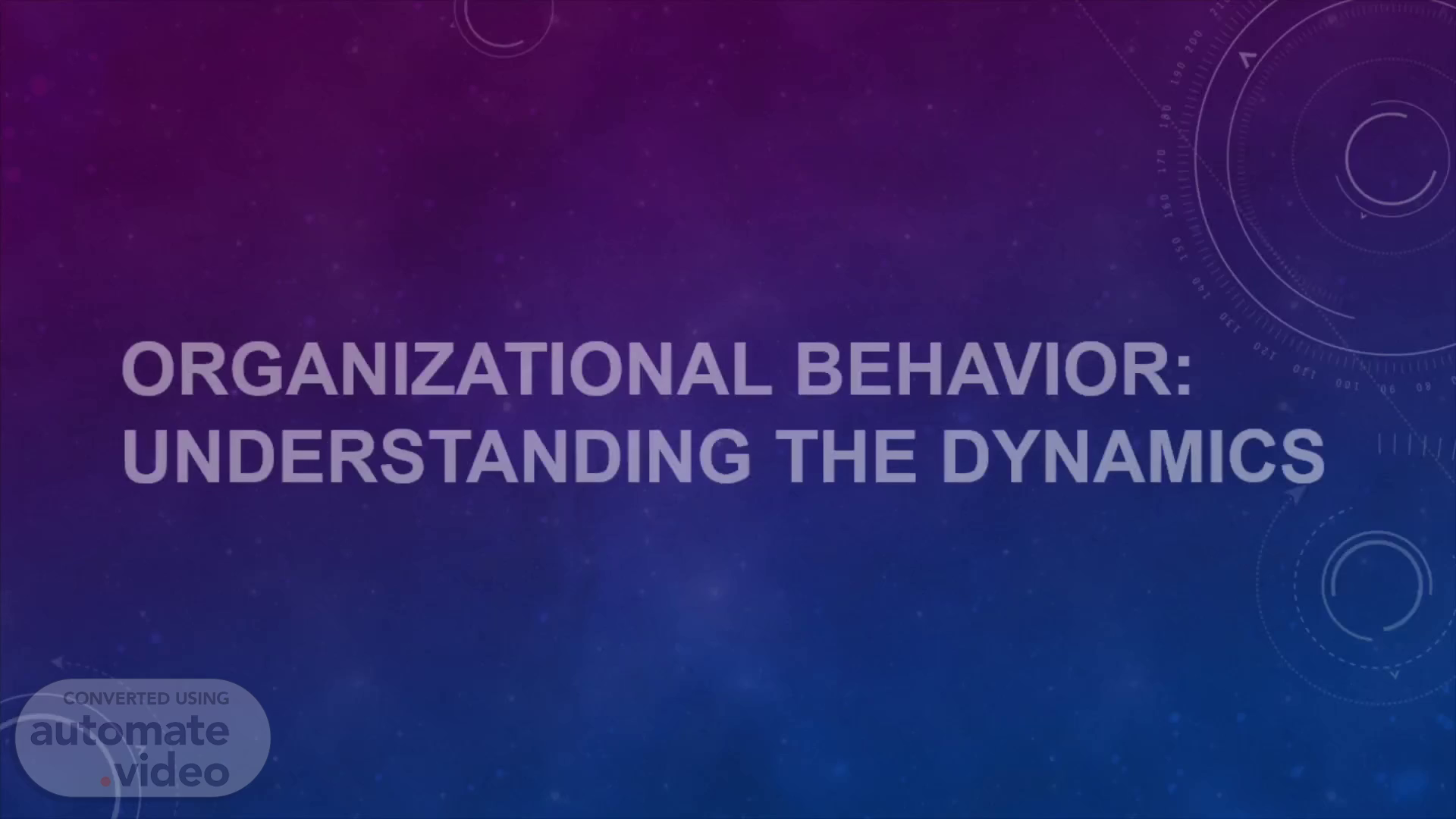
Organizational Behavior: Understanding the Dynamics
Scene 1 (0s)
[Audio] Welcome to Topworker.Today we will be discussing on the Basics of Organizational Behaviour..
Scene 2 (7s)
[Audio] Organizational Behavior, often abbreviated as OB, is the study of how individuals, groups, and structures within an organization interact and influence one another. It draws knowledge from various fields like psychology, sociology, anthropology, and management. In essence, OB helps us understand and manage human behavior in the workplace, ultimately improving organizational effectiveness and employee well-being.".
Scene 3 (36s)
[Audio] Organizational Behavior is crucial in the workplace for various reasons. It enhances employee performance, supports effective leadership, facilitates conflict resolution, improves communication, helps manage change, shapes organizational culture, prioritizes employee well-being, promotes ethical decision-making, optimizes resource management, and provides a competitive advantage. It's the cornerstone of a thriving and productive organization.".
Scene 4 (1m 6s)
[Audio] Let's delve into some key concepts in Organizational Behavior: Attitude and Job Satisfaction: Attitudes are individuals' feelings, thoughts, and evaluations about their jobs, which affect performance and retention. Motivation: It explores what drives employees to perform at their best. Communication: Effective communication is the cornerstone of teamwork and productivity. Leadership: Leadership styles influence employee behavior and organizational culture. Organizational Culture: Culture shapes an organization's values, norms, and beliefs, impacting the workplace environment and success.".
Scene 5 (1m 54s)
[Audio] Organizational Behavior has a profound impact on organizations: It enhances productivity by motivating employees. It improves employee satisfaction, reducing turnover and boosting morale. It enables effective conflict resolution, reducing disruptions. It optimizes resource allocation, ensuring efficient use. It facilitates adaptation to change, making transitions smoother. It fosters a strong organizational culture, attracting top talent and enhancing the organization's reputation.".
Scene 6 (2m 33s)
[Audio] Building a positive organizational culture is essential for success. A positive culture aligns employees with the organization's values, mission, and goals, enhancing engagement and commitment. It boosts employee satisfaction, reduces turnover, and attracts top talent. Positive cultures encourage innovation, collaboration, and adaptability, all crucial in a changing business landscape.".
Scene 7 (3m 2s)
[Audio] To build a positive organizational culture, consider these strategies: Clear Values: Clearly define your organization's values. Effective Leadership: Leadership sets the tone for the culture. Employee Involvement: Engage employees in decision-making. Recognition and Rewards: Acknowledge and reward positive behaviors. Continuous Learning: Encourage ongoing employee development. Work-Life Balance: Promote a healthy work-life balance. Diversity and Inclusion: Foster a diverse and inclusive environment. Open Communication: Encourage transparent communication. Conflict Resolution: Develop effective conflict resolution processes. Feedback Loops: Implement systems for ongoing feedback.".
Scene 8 (4m 8s)
[Audio] Looking to the future, several trends will shape the field of Organizational Behavior: Technology Integration: Embrace AI and remote work tools. Flexible Work Arrangements: Support remote and gig work. Diversity and Inclusion: Prioritize equity and inclusion. Sustainability and Ethics: Incorporate responsible practices. Globalization: Cultivate cross-cultural competency. Agile Teams: Foster teamwork, adaptability, and learning. Adaptability and Continuous Learning: Crucial for staying relevant in a rapidly changing landscape. Embrace change, learn, and pivot quickly to succeed.".
Scene 9 (5m 5s)
[Audio] "Organizational ethics is critical for several reasons: Importance: Ethical behavior builds trust, boosts employee morale, ensures legal compliance, fosters customer loyalty, and supports long-term sustainability. Ethical Decision-Making: It involves a process of issue identification, data gathering, alternative evaluation, decision-making, implementation, and continuous review. Corporate Social Responsibility (CSR): CSR represents a commitment to ethical practices and societal well-being. It enhances reputation, sustains the environment, engages employees, impacts communities, and ensures long-term success.".
Scene 10 (5m 54s)
[Audio] Thank you for your attention. If you have any questions or would like to discuss any of these topics further, please feel free to ask. Your understanding of Organizational Behavior is essential for achieving success in the workplace and beyond.".